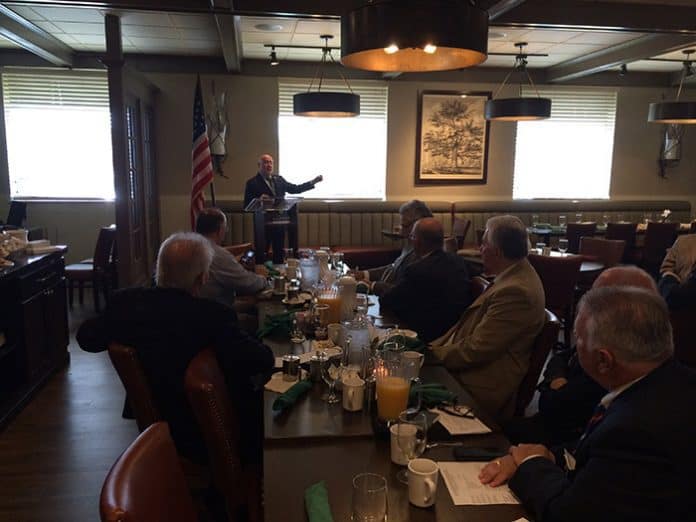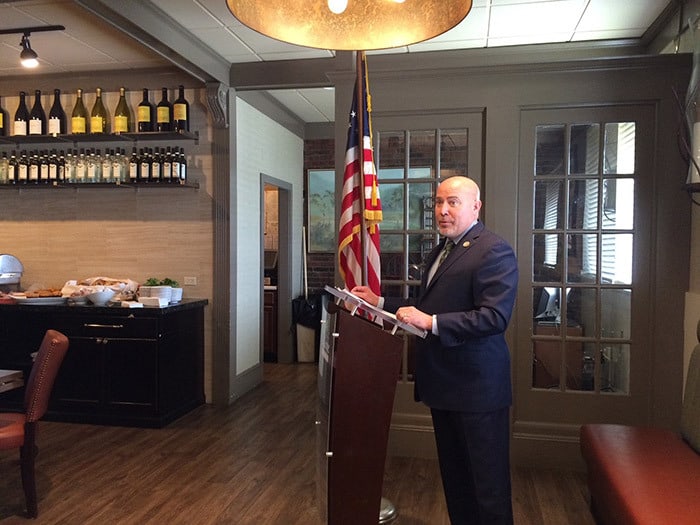
TOMS RIVER – Congressman Tom MacArthur (R-3rd) spoke about the federal budget, opioid abuse, and other topics at the Ocean County Mayors’ Association meeting on May 15.
He gave a brief speech to the government officials assembled at a breakfast meeting, and then took questions.
Offshore Drilling
Some of the officials were concerned about offshore drilling. The issue stemmed from when Secretary of the Interior Ryan Zinke announced a Draft Proposed Program months ago that initially included the potential lease sales to energy companies that would have allowed them to look for fuel off the Jersey shore.
Florida officials petitioned the federal government to take them off the market, because of the detriment that drilling would cause to the tourism industry. When they were successful, New Jersey officials followed suit.
MacArthur said that there are less resources off the coast of New Jersey than in other areas. He had spoken to Zinke about it and there was an indication from his office that there’s less interest in New Jersey.
“He’s a friend, and I trust him, but he’s not the only player in this,” he said.
Taxes
As of this publication date, the federal debt is currently at $21.1 trillion.
“That $21 trillion is in the background of every vote I make,” MacArthur said.
The federal Tax Cuts And Jobs Act, passed last year, has an additional $1.5 trillion in debt built into it. MacArthur was the only one from New Jersey to vote for it.
“Although I had to vote alone, I am not shying away from that vote,” he said. Included in that bill was a deduction for State and Local Taxes up to $10,000.
“That was worth getting $3.4 billion to this state every year. What would another ‘no’ vote do for New Jersey? Nothing,” he said.

Opioid Abuse And Bipartisanship
“Yesterday, 174 people died of an overdose in this country. People have already died this morning while we’re sitting here,” he told the group assembled for the meeting. If this number of people had died from any other cause, people would be marching for change.
Two ways to combat this are funding and policy change. Policy changes he mentioned included preventing people from doctor shopping or pharmacy shopping for a place to get prescriptions, and reducing the amount of pills that come from a first prescription.
The war against opioid abuse needs to continue to be funded. Every dollar of prevention saves $6 in treatment and $5 in criminal justice costs, he said.
“If we don’t put enough money into it, we’re not serious about it,” he said. “It’s one of the biggest crises of this generation. It’s bigger than any of us, but it’s not bigger than all of us.”
With this, he segued into bipartisanship, and how people need to work together. He spoke of working with Sen. Cory Booker to get the area designated a High Intensity Drug Trafficking Area, which provided resources leading to at least one major arrest.
He reaffirmed his strategy to work in a bipartisan manner whenever possible. It’s a good way to make lasting change, because bipartisan policies are not changed as quickly when control of the House changes.
“It’s an election year. It’s getting harder to work together,” he said.
He addressed what was reported as a shouting match between him and Rep. Joe Crowley (D-NY) over the resignation of Chaplain Patrick Conroy.
“I thought Joe was taking a cheap shot,” and politicizing the Conroy issue, he said. “He’s a friend. I go to his prayer service every week.”






